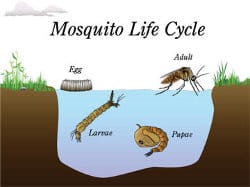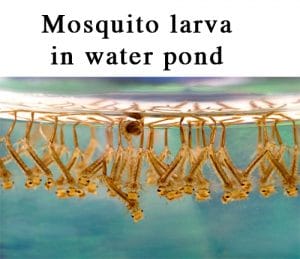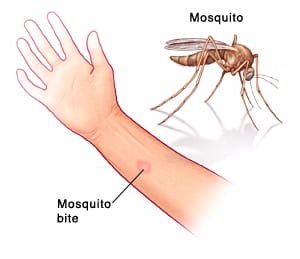Are you especially concerned about mosquitoes this summer as you work in your garden? Do you wonder how to care for your bird baths so that your birds are happy but you are not creating a breeding pond for mosquitoes? We had the opportunity to talk with University of Georgia’s mosquito specialist, Elmer Gray, and asked him for some research-based mosquito information.
Mr. Gray started our conversation by stating the cool nights and dry weather that we have recently experienced have delayed mosquito season in Georgia. This is good news. However, as soon as the temperatures are consistently warm, here come the mosquitoes.

When the mosquitoes arrive there are a few things you can do to limit your exposure to the insects. Your first line of defense is to wear light colored, loose fitting clothing. Also, use EPA approved insect repellent. Be sure to follow instructions given on the repellent. Homemade repellents created from banana peels, fabric softener sheets or garlic just don’t work.
Getting rid of standing water is an important part of mosquito control. Inspect old plant pots, lawn furniture, and anything outdoors that could hold even a small amount of water. For those of us who have bird baths, Mr. Gray advises that cleaning them once a week should work nicely to limit mosquitoes while making sure the birds have water. Clean water is not attractive to female mosquitoes for laying eggs. Clean water would not have food, like algae, for the resulting larvae to eat.

For those concerned about the Zika virus, the Asian Tiger Mosquito has been known to transmit the virus in Africa and is present in Georgia. However, there is no reason to conduct any widespread mosquito spraying without determining that you have a significant amount of mosquitoes in your area.
Surveillance should be conducted to document the presence of the insects. Landing rate counts are easy to do. Stand still for one minute, preferably in dark clothing. Count how many mosquitoes land on the front half of your body in one minute. If five or more land on you, adulticide applications could be warranted.
When applying adulticide spray realize that you are not killing just mosquitoes. The spray can also kill bees, butterflies, and other beneficial insects. If you have to spray, do so late in the day to avoid killing other insects and avoid spraying flowering plants. Mr. Gray also points out that mosquitoes do not hide in turfgrass. So spraying turfgrass is not useful. However, English Ivy is a popular plant for mosquitoes and could be targeted for spraying.
To summarize, the fear of mosquitoes should NOT keep us out of the garden. The key is to protect yourself and do not over-react. If you want to know what type of mosquitoes you have, contact your local UGA Cooperative Extension office for identification.
Thank you, Mr. Gray, for your expertise. UGA’s entomology department has a webpage dedicated to understand mosquitoes.
Happy Gardening!
- ParSLAY the Day! - June 12, 2024
- 6th Annual Great Southeast Pollinator Census - May 28, 2024
- Are you ready for Pepper Palooza? - July 5, 2023

Great information to have on mosquitoes, particularly in light of past and current medical concerns.